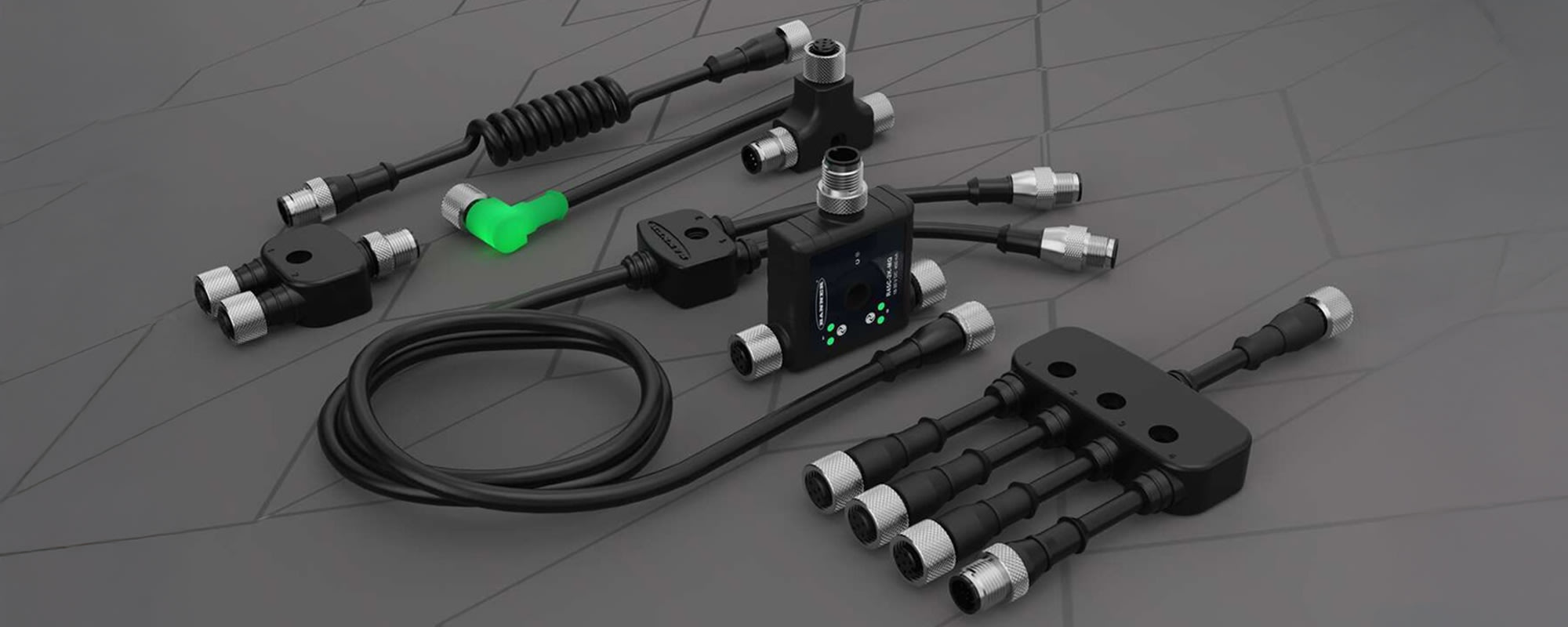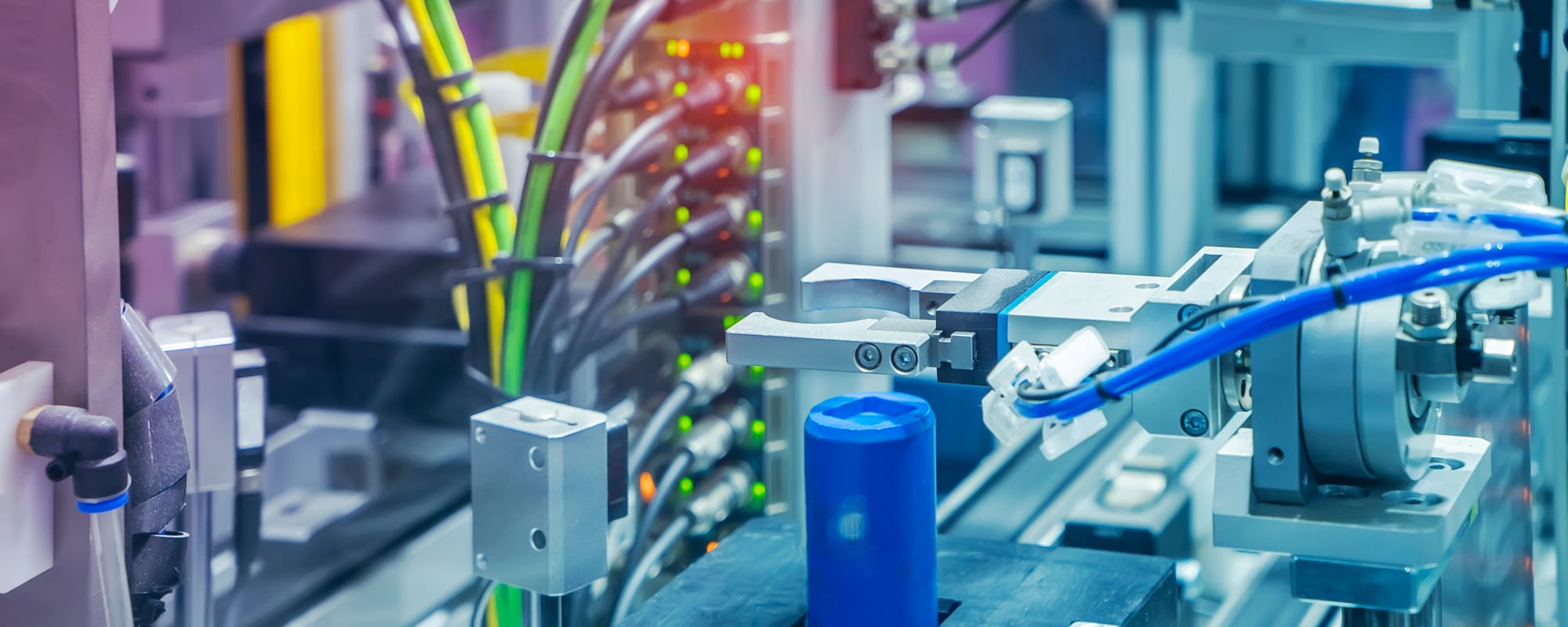RS’s Interconnect Category Manager, Jaime Plank, discusses industrial connectivity, addressing evolving trends, differentiation, applications, and several of the most popular industrial connectivity solutions.

Jaime Plank
Interconnect Category Manager
RS
In this latest installment of RS’s Ask the Expert Series, RS’s Interconnect Category Manager, Jaime Plank, talks about how she came to work in connectivity, addresses evolving trends including wireless connectivity, explains what makes industrial connectivity solutions special and what types of applications they’re used in, introduces some of the most prevalent industrial connectivity solutions and describes the unique value that RS provides for industrial connectivity customers.
Hi Jaime. How did you come to work in industrial connectivity and what do you find most interesting about this segment of the electronics industry?
I’ve worked for the Electrocomponents group for 12 years. I started out in collections at RS in 2006 and then moved over to our national sales team in 2007. After a brief hiatus, I came back to RS in 2011, earning the title of National Sales Account Manager, and became fascinated with product management because they were working directly with suppliers, choosing the products we were stocking and the suppliers we were adding to the line card. In 2014, I took on a Product Manager role, where I got to focus on the management, development and execution of supplier and product action plans within the interconnect, passive and electromechanical (IP&E) segment. I helped determine which products RS would stock and promote, served as the liaison between RS, our suppliers and our sales team and developed and executed marketing plans and activities — and I loved it!
So, in 2017, I started working on my Master of Industrial Distribution degree at Texas A&M University. Since classes were available online, I took an opportunity to move to the U.K. with my family and spent the first year and a half of my degree program as the Senior Category Manager at RS Components for their industrial interconnect segment. This role gave me the opportunity to work with our industrial connector suppliers globally and see first-hand where many of these products were being manufactured in Europe.
Shortly after graduating in 2019, I was back in Texas and returned to RS as Category Manager for Interconnect, Wire/Cable, Electronics and Board Level Test and Measurement, where I’ve been for about two and a half years now. It’s great to be back and working with our amazing supplier community in this space again.
Even though connectivity is essential to electronics, connectors spent decades being specified at the end of design cycles, almost as an afterthought. Now they’re widely recognized as critical components and often even drive designs. What do you think brought about that shift?
Suppliers in the connector space have proven to be very innovative in their designs — offering unique form factors, size options and functionalities — and have worked really hard for their spot at the start of a design cycle, investing a lot of time, effort and expertise into OEMs even before they start their next project and proactively solving the connectivity challenges they typically face. In recent years, modular connectors that enable economical customization, quick and easy installation, space savings and greater scalability have grown more prevalent, as have connectors capable of executing several functions — like transmitting power, signal and data within a single form factor.
Increased automation is another factor, especially as it extends across a diverse range of industries ranging from fields to freeways and factories. Automation requires a significant amount of power, signal and data connectivity, and that connectivity is established using connectors and cables — even when portions of the connected system employ wireless connectivity.
Since you mentioned wireless connectivity and that’s another growth area, how do traditional connectivity components factor into these designs?

We’ll always need wire, cable and connectors to transmit power and data. No matter how many things are wirelessly communicating, you still need cable and connectors from a power standpoint. Components including routers and repeaters are still plugged into an outlet, and they’re far from the only ones. They’re all just more discreet now. But while they may be missing from what would have previously been the last leg or so of a cable run, and there’s rarely a giant cable draped across the ground or a huge circular connector bulging out of the wall nowadays, cable and connectors are still responsible for powering wireless devices and enabling them to communicate with each other. In addition, from a communications standpoint, emerging wired connectivity technologies like Single-Pair Ethernet (SPE) still offer the fastest, highest signal integrity, highest reliability and most secure data transmission. So, while advances in wireless connectivity are certainly exciting, there is still a significant need for and numerous advantages to wired connectivity.
What makes industrial connectivity solutions special and what types of applications are they used in?
Industrial connectivity products have ruggedized designs made to reliably withstand a wide range of harsh operating conditions including shock, vibration, extreme temperatures and exposure to weather, water, dirt, dust and chemicals. Their form factors and contacts are not only built to last in such demanding applications but to provide peak performance despite these common hazards.
Industrial connectivity is critical for industrial factory automation applications, but these solutions are also well-suited for use in the food and beverage manufacturing and packaging, aerospace, transportation, energy, agricultural and panel building industries.
What are some of the most prevalent industrial connectivity solutions?
When we’re talking about industrial connectivity, we’re typically talking about solutions including M8 and M12 circular connectors and cable assemblies, circular and rectangular connectors, terminal blocks, data, Ethernet and telecom connectors, Cat 5 and Cat 6 Ethernet cables and cordsets, wire and cable, cable management and associated tools.
M8 and M12 circular connectors are designed to provide secure, reliable connections in demanding industrial applications and facilitate the quick and easy replacement of sensors, encoders, switches and other I/O devices in industrial machinery. M8 connectors are available with three or four pins, are widely available with watertight sealing and are often used with industrial sensors. M12 connectors are available with three, four, five, six, eight, and 12 pins, are widely available with IP65, IP68 and IP69 sealing and can be used for fieldbus connections. Common applications for these connectors include sensors, actuators, switches, PLCs and I/O boxes in food and beverage processing, machine building, rubber and plastics, textile and printing press and HVAC applications. RS supplies more than 9,000 M8 and M12 connectors and has more than 1,500 stocked SKUs from industry-leading suppliers including Phoenix Contact, TE Connectivity, Amphenol and Molex.
M8 and M12 cordsets, are designed to quickly and easily establish connections between field devices and terminal connections and transfer power and/or data to components and processes. They are frequently used in industrial control, material handling, automotive manufacturing, agricultural equipment, petrochemical processing, food and beverage and high production volume applications. RS supplies more than 7,000 M8 and M12 cordsets and has nearly 3,000 stocked SKUs from leading suppliers including Turck, Phoenix Contact, HARTING, Molex and Amphenol.

Other industrial circular connectors are used to power electrical devices and reliably transmit data or electrical signals in harsh industrial environments including control cabinet, aerospace, broadcast, defense and security, energy, instrumentation and transportation applications. They are quick and easy to mate and unmate without any tools, which helps reduce installation time, and are widely available with composite and metal shells equipped with an insulator and contacts that are often paired with a cable, as that configuration makes them especially resistant to accidental decoupling or environmental interference. RS supplies more than 46,000 circular connectors and has more than 4,000 stocked SKUs for industrial circular connectors from leading suppliers including TE Connectivity, ITT Cannon, Bulgin, Amphenol and SOURIAU-SUNBANK.
Rectangular connectors are engineered to optimize signal integrity, improve design flexibility and ease of handling and potentially even lower costs in high-reliability wire-to-wire and wire-to-board applications with limited internal space. They are available in various housing sizes and materials ranging from molded plastic to die-cast metal alloy, and they often include optional locking features for added security in harsh environments. Rectangular connectors are popular in modular machine design, robotics, factory automation, rail transportation, power generation and control box applications with harsh operating environments. RS supplies more than 17,000 rectangular connectors and has more than 3,500 stocked SKUs from leading suppliers including HARTING, TE Connectivity, Molex, ITT Cannon and Lapp.

Terminal blocks, which are also called connection terminals and terminal connectors, are designed to deliver safe, secure and well-organized wire connections in applications ranging from motion control and automation systems, railway infrastructure and rolling stock, and panel building, process engineering, shipbuilding, automotive manufacturing and energy, chemical and petrochemical processing equipment to HVAC systems and white goods. They have an insulated frame, a clamping component that secures two or more wires together and a current-carrying element, like a metal conducting strip or terminal bar, and are usually modular and designed for DIN rail mounting since that arrangement allows customers to quickly and easily modify the number of terminals according to application requirements. But board-mount versions are available as well. Other types of terminal blocks include ground terminal blocks, fused connection terminal blocks, which are similar to pass-through terminal blocks save for the fact that a metal connection strip replaces the fuse, thermocouple terminal blocks, I/O blocks, sensor blocks, disconnect terminal blocks, which enable convenient connections and disconnections without removing wires, and power distribution blocks, which provide safe, convenient, and economical solutions for distributing power from a single input source to multiple outlets. RS supplies more than 28,000 terminal block connector solutions and has nearly 6,000 stocked SKUs for terminal block connectors from industry-leading suppliers including Phoenix Contact, TE Connectivity, Molex, Marathon Special Products, Altech and WECO.
Data, Ethernet and telecom connectors are vital for modem, computer and network hub connections in industrial, commercial and even residential environments. Since they’re required in every application equipped with telephones or a wired network, there’s an extensive range of datacom and telecom connectors available on the market. Solutions differ by the types of data they’re designed to transmit, the speed at which they transmit data, and their form factors and interfaces. RS supplies more than 5,600 data, Ethernet and telecom connectors and has more than 1,300 stocked SKUS from leading suppliers including Amphenol, TE Connectivity, Molex, SOURIAU-SUNBANK, HARTING and Neutrik.
There are also lots of industrial connectivity solutions that aren’t connector products, including wide range of multiconductor, coaxial, composite, audio, video, data and thermocouple wire and cable; connector-adjacent tools like crimpers, heat guns, insertion and extraction tools and termination tools; Cat 5 and Cat 6 Ethernet cables and cordsets and cable management solutions, including cable reels and caddies, strain relief, ducts, sleeves, tubing and clamps. RS offers more than 3,000 stocked wire and cable SKUs from leading manufacturers including RS Pro by RS, Belden, Alpha Wire and General Cable in addition to more than 950 stocked connector-adjacent tool SKUs, more than 1,300 Cat 5 and Cat 6 Ethernet cable and cordset SKUs and more than 9,000 stocked cable management SKUs.
Why should customers come to RS for industrial connectivity solutions?
Industrial connectivity is at the heart what we do. In fact, it’s one of our largest product categories and has been rapidly expanding in recent years. RS currently offers more than 33,000 in-stock and ready-to-ship industrial connectivity products from trusted global suppliers. This vast selection makes us a one-stop-shop for industrial connectivity solutions including connectors, wire, cable and tools, and our talented technical support team can leverage their combined experience to help customers overcome any industrial application challenge they’re facing.
Our extensive industrial connectivity product range also includes a sophisticated blend of materials that satisfy even the strictest application requirements, including shell materials optimized for military and aerospace applications and a wide variety of contact plating materials designed to enhance connector performance, durability and longevity. RS is proud to offer many of the industry’s most trusted and proven connector, wire and cable products as well as the virtually endless range of rugged and reliable semi-custom, end-to-end solutions that we can make to ideally suit customers’ unique requirements using economical, off-the-shelf parts that in-stock and ready to ship.

Another benefit of sourcing industrial connectivity solutions from RS is our RS Pro by RS line of private label products, which offers a vast selection of quality products that are designed for various electronics and automation applications, rigorously tested, attractively priced, compliant with all relevant international standards and backed by the RS Pro Seal of Approval, which is only awarded after a meticulous quality control process based on stringent international standards. The RS Pro by RS line also offers a wide range of industrial connectivity solutions that deliver quality customers can trust at a price–performance ratio that’s ideally suited for an extensive range of applications. Solutions include M8 and M12 connectors, M8 and M12 cordsets, industrial circular connectors, rectangular connectors, terminal blocks and strips, data, Ethernet and telecom connectors, cable, connector and crimp tools, Cat 5 and Cat 6 Ethernet cables and cordsets, and cable management, and inventory is well stocked at our Fort Worth facility.
Do you have any final thoughts or advice to share about industrial connectivity?
Connectivity components are critical elements of all electronic designs — whether for power, signal, data or all three — and industrial connectivity components are especially critical due to the harsh and hazardous nature of industrial applications ranging from factory automation equipment to agricultural equipment. RS is proud to offer a vast selection of industrial connectivity solutions designed and manufactured by trusted suppliers, and both our team and our supplier partners are eager to help you evaluate your options and identify the optimal industrial connectivity solutions for your unique application requirements.
Additional Links
- Micro-Change Series M12 connectors
- HARTING connectorization versus hardwiring
- HARTING Han connector solutions
- RS Pro by RS
For more information about RS’s extensive portfolio of industrial connectivity solutions, please visit the links embedded throughout this article. For assistance identifying and deploying industrial connectivity solutions optimized for your unique application, please contact your local RS representative at 1.866.433.5722 or reach out to technical support team.







